Chinese President Xi Jinping is not seeking peace in Russia-Ukraine war: Rebekah Koffler
Former DNI intelligence officer Rebekah Koffler claims reports Chinese President Xi Jinping will propose a peace plan to President Vladimir Putin are 'all a charade' on 'Fox News Live.'
"All warfare is based on deception. Hence, when we are able to attack, we must seem unable; when using our forces, we must appear inactive; when we are near, we must make the enemy believe we are far away; when far away, we must make him believe we are near."
This is an admonition written by the renowned ancient Chinese strategist and general Sun Tzu in his seminal work, "The Art of War," the earliest known treatise on war and military science.
Sun Tzu, whose work dates back to the fifth century B.C. and is now studied at military academies across the world, stressed the paramount importance of deception and surprise in warfare. To this day, contemporary Chinese military planners religiously adhere to Sun Tzu’s guidance. China’s entire warfare philosophy centers on this precept - to win means to trick your enemy. In other words, victory is only possible if you can deceive your opponent.
PUTIN AND XI SEEK TO WEAPONIZE ARTIFICIAL INTELLIGENCE AGAINST AMERICA
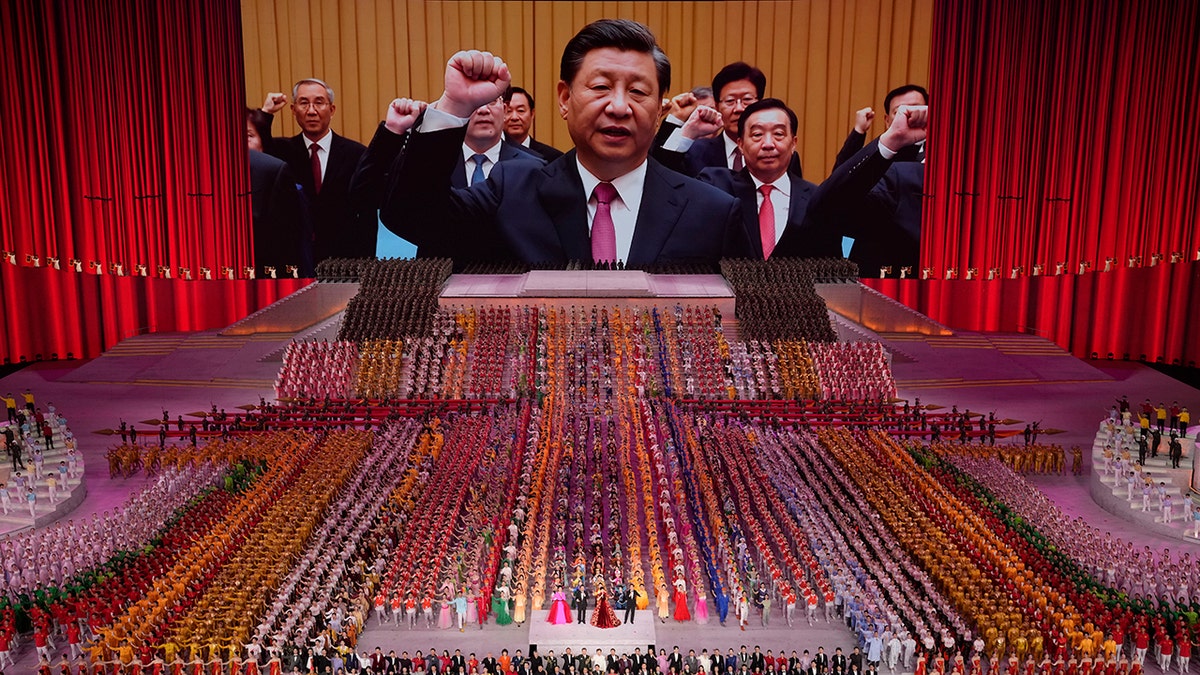
FILE - In this June 28, 2021, file photo, Chinese President Xi Jinping is seen leading other top officials pledging their vows to the party on screen during a gala show ahead of the 100th anniversary of the founding of the Chinese Communist Party in Beijing. An avalanche of changes launched by China's ruling Communist Party has jolted everyone from tech billionaires to school kids. Behind them: Xi's vision of reviving an idealized early era of vigorous party leadership, with more economic equality and tighter control over society and billionaire entrepreneurs. (AP Photo/Ng Han Guan)
And tricking leaders in Washington is what Beijing has been doing. Make no mistake, China’s recent diplomatic charm offensive aimed at positioning itself as a peacemaker in Ukraine is nothing but a Sun Tzu-inspired gimmick. Its purpose is to divert Washington’s attention from China’s real target – Taiwan, buy time to finalize the PLA’s war preparations, and then launch a surprise attack on Taiwan. The peacemaker charade, including a 12-point peace plan, is intended to catch the Pentagon off guard, leaving U.S. forces to scramble.
Chinese President Xi Jinping met with Russia’s President Vladimir Putin in March and held a video conference call with Ukraine’s President Volodymyr Zelenskyy in April, supposedly, to push a cease fire. But Beijing knows full well that neither Washington nor Kyiv would agree to let Russia keep 17-20% of Ukraine’s territory that Moscow had seized, as called for in the plan. Xi knows that Putin cannot quit this war, the outcome of which is perceived as existential by the Kremlin.
Moscow believes that without restoring its strategic security buffer zone -- of which Ukraine is part of, in Moscow’s view -- lost as a result of the collapse of the USSR, Russia will cease to exist as a state in the long-term. Loss of Ukraine to NATO, in Moscow’s rationale, would embolden other post-Soviet states, like Georgia and Moldova, to attain membership an alliance that Russia’s military doctrine has codified as security threat number one.
Despite China’s peacemaker theatrics, Beijing’s real goal is to keep the Russia-Ukraine conflict going as long as possible. China only benefits from having both of its primary perceived adversaries, the U.S. and Russia erode their respective combat arsenals in a proxy war. While Moscow and Beijing currently have joined forces against the common enemy, the U.S., in reality Russia and China are adversaries and are vying for dominance in Eurasia.
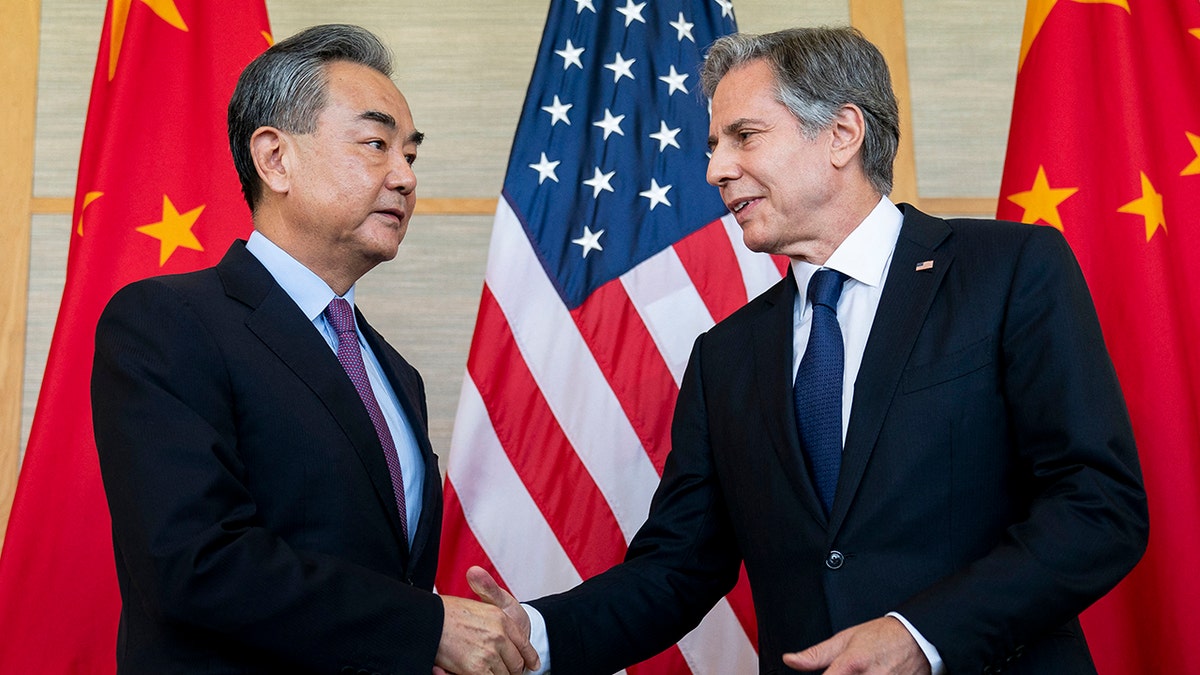
US Secretary of State Antony Blinken (R) shakes hands with China's Foreign Minister Wang Yi during a meeting in Nusa Dua on the Indonesian resort island of Bali on July 9, 2022. ((Photo by Stefani Reynolds / POOL / AFP) (Photo by STEFANI REYNOLDS/POOL/AFP via Getty Images))
AFTER XI-PUTIN MEETING, TEAM BIDEN STILL DOESN'T GET WHAT'S JUST HAPPENED TO THE UNITED STATES
Washington establishment 'experts' rationalize that ending the flow of billions of dollars worth of weaponry to Ukraine will hand victory to Putin, emboldening Xi to invade Taiwan. It is the same characters who got every other foreign policy issue wrong -- Afghanistan, Iran, Libya, Syria, and of course, the real Russia threat while focusing instead on the collusion hoax manufactured by the administrative security state. Truth is, Xi doesn’t need any extra encouragement to execute China’s decades old "One China" policy. Beijing vowed to "unify" the renegade province of Taiwan with mainland China back in 1949, including by force.
China’s defense minister General Li Shangfu reminded us of this as recently as Thursday. In a meeting with Singapore’s defense chief Ng Eng Hen, Li told his Singaporean counterpart that the PLA will "absolutely not" renounce the use of force on Taiwan. On Sunday, Li strengthened his warning to Washington. During the Shangri-La Dialogue, an annual gathering of some of the world’s top defense officials in Singapore, China’s defense chief stated that war between China and the United States would be an "unbearable disaster for the world."
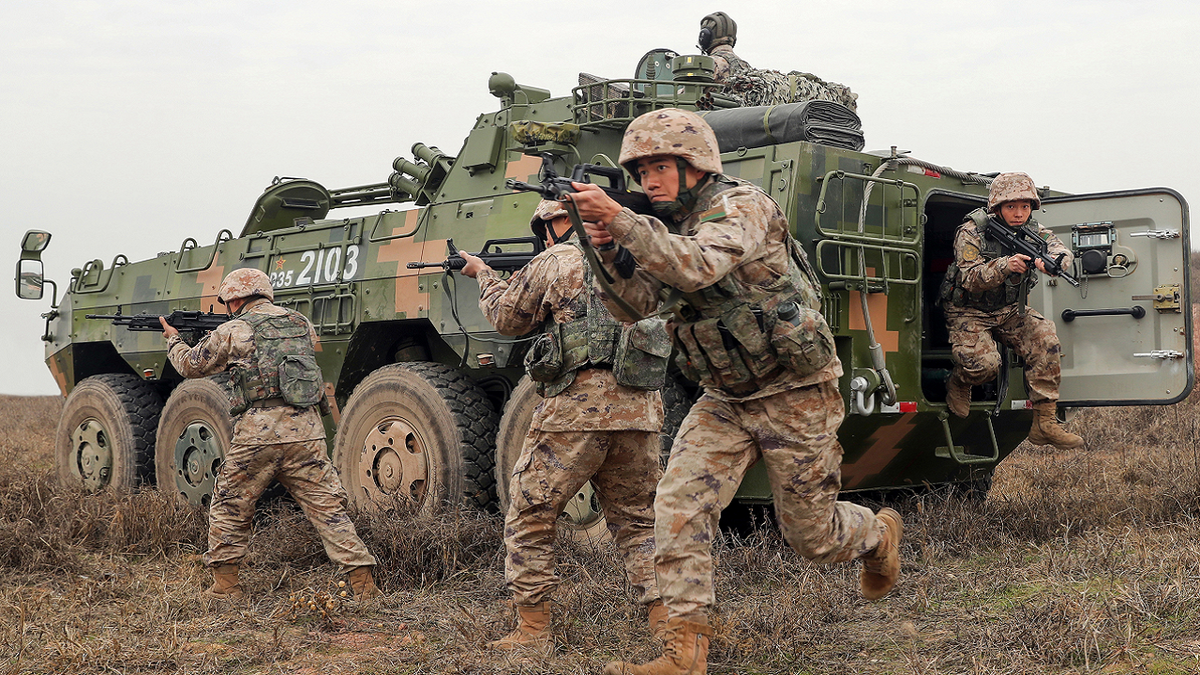
Soldiers quickly get out of their cars to take up positions during military drills in Jiangxi, China, on Jan. 29, 2023. (CFOTO/Future Publishing via Getty Images)
Establishment analysts, dominating U.S. elite media airwaves, interpreted Li’s statement as a sign of Beijing’s recognition of the need for Washington and Beijing to improve relations that are "at a record low." But what Li was actually doing is what is called in the intelligence business as strategic messaging. He was warning Washington to stay out of China’s perceived sphere of influence in Asia, lest it would incur "unbearable" costs.
Consider the context of Li’s warnings. Last week, the Chinese embassy spokesman Liu Pengyu, rejected a U.S. offer to have Defense Secretary Lloyd Austin meet with China’s counterpart Li Shangfu. Liu Pengyu implied the Pentagon was insincere in seeking communication and accused the U.S. of "seeking to suppress China through all possible means."
CLICK HERE TO GET THE OPINION NEWSLETTER

The U.S. Department of State is seen on January 6, 2020 in Washington, DC. (Mark Wilson/Getty Images)
For the past year, Chinese warships have been harassing U.S. Navy ships in the Taiwan Strait, with the last encounter taking place on Saturday, when a People’s Liberation Army Navy warship cut across the bow of a U.S. guided-missile destroyer, a distance of 150 yards. This provocation looked like a brazen attempt to instigate an incident.
In his speech, China’s defense chief Li then told foreign militaries to "mind your own business," and not operate warships and aircraft close to China’s territorial waters, in order to avoid problems. He blamed Washington for the recent provocative encounters.
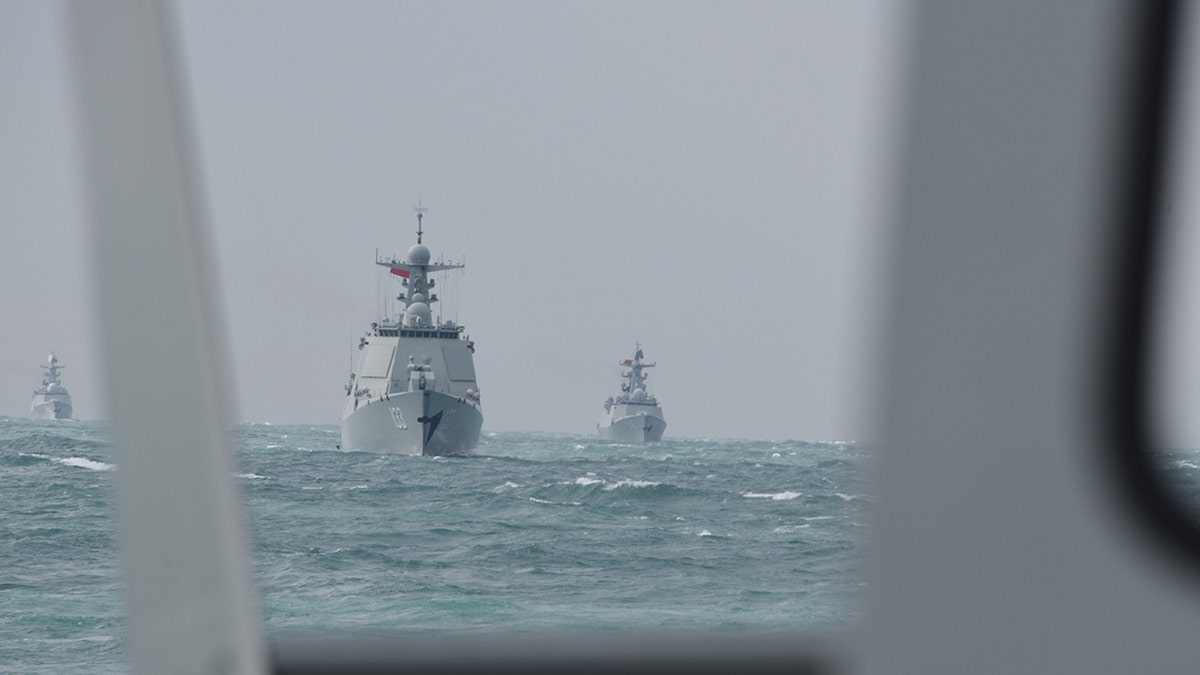
Warships of Chinese navy take part in a joint naval exercise, Joint Sea 2022, in the East China Sea on Dec. 21, 2022. Chinese and Russian navies on Wednesday kicked off a joint naval exercise, Joint Sea 2022, in the East China Sea. TO GO WITH "China, Russia hold joint naval exercise." (Li Yun/Xinhua via Getty Images)
Having Washington hyper-focused on Ukraine, pouring billions of dollars in military aid into yet another endless and unwinnable war suits Beijing perfectly. The Pentagon already has depleted crucial weapons stockpiles to such dangerous levels that U.S. forces would run out of existing precision weapons in less than a week in a potential war with China, according to a prominent Washington DC-based think tank. China, which already holds a military advantage over the U.S. by some measures -- having more ships, airplanes, and both offensive and defensive missiles – is overjoyed to see the Pentagon continue eroding American combat readiness in Ukraine.
The U.S. security apparatus got caught off guard by Putin’s invasion of Ukraine and has cost billions to taxpayers. Biden’s current preoccupation with Ukraine at the expense of preparing our military for an inevitable war with China will have a much steeper cost. In a high-intensity shooting war with a "peer adversary," as the Pentagon terms China, U.S. forces would highly likely sustain tens of thousands of casualties. Or more. Washington’s getting duped into staying focused on Ukraine is dangerous for America.
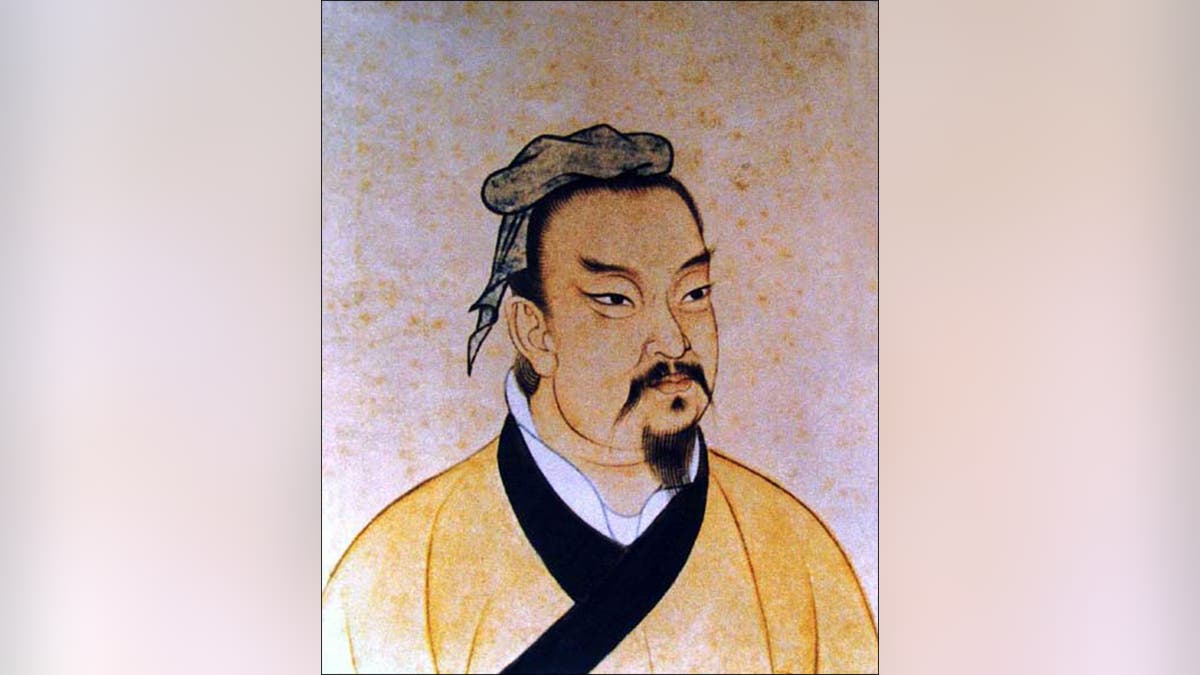
Sun Tzu or Sunzi, was an ancient Chinese military general, strategist and philosopher who is believed to have authored 'The Art of War', an influential ancient Chinese book on military strategy. Sun Tzu has had a significant impact on Chinese and Asian history and culture, both as an author of the Art of War and through legend. During the 19th and 20th centuries, Sun Tzu's Art of War grew in popularity and saw practical use in Western society, and his work has continued to influence both Asian and Western culture and politics. (Photo by: Pictures From History/Universal Images Group via Getty Images) (Pictures From History/Universal Images Group via Getty Images)
CLICK HERE TO GET THE FOX NEWS APP
If Team Biden is serious about coming to Taiwan’s rescue, it must direct the Pentagon to devise a counterstrategy to China’s plans and immediately begin restocking the ammunition and critical high-tech weapons that Washington had funneled to Kyiv.
"Victorious warriors win first and then go to war, while defeated warriors go to war first and then seek to win," was another of Sun Tzu’s observations in The Art of War. The Pentagon must reverse its decades-old failed strategy of getting into wars first and then looking for ways to win later.

